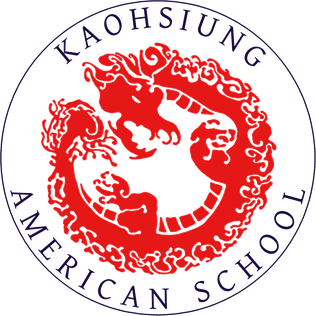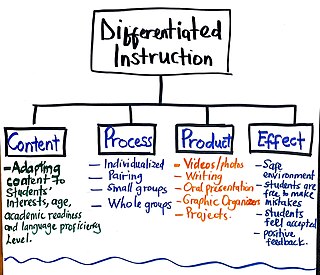Progressive education is a pedagogical movement that began in the late nineteenth century and has persisted in various forms to the present. In Europe, progressive education took the form of the New Education Movement. The term progressive was engaged to distinguish this education from the traditional curricula of the 19th century, which was rooted in classical preparation for the university and strongly differentiated by social class. By contrast, progressive education finds its roots in modern experience. Most progressive education programs have these qualities in common:
Professional development is learning to earn or maintain professional credentials such as academic degrees to formal coursework, attending conferences, and informal learning opportunities situated in practice. It has been described as intensive and collaborative, ideally incorporating an evaluative stage. There is a variety of approaches to professional development, including consultation, coaching, communities of practice, lesson study, mentoring, reflective supervision and technical assistance.
Alternative education encompasses many pedagogical approaches differing from mainstream pedagogy. Such alternative learning environments may be found within state, charter, and independent schools as well as home-based learning environments. Many educational alternatives emphasize small class sizes, close relationships between students and teachers and a sense of community.

A preschool, also known as nursery school, pre-primary school, or play school, is an educational establishment or learning space offering early childhood education to children before they begin compulsory education at primary school. It may be publicly or privately operated, and may be subsidized from public funds.
The Reggio Emilia approach is an educational philosophy and pedagogy focused on preschool and primary education. This approach is a student-centered and constructivist self-guided curriculum that uses self-directed, experiential learning in relationship-driven environments. The programme is based on the principles of respect, responsibility and community through exploration, discovery and play.
Collaborative learning is a situation in which two or more people learn or attempt to learn something together. Unlike individual learning, people engaged in collaborative learning capitalize on one another's resources and skills. More specifically, collaborative learning is based on the model that knowledge can be created within a population where members actively interact by sharing experiences and take on asymmetric roles. Put differently, collaborative learning refers to methodologies and environments in which learners engage in a common task where each individual depends on and is accountable to each other. These include both face-to-face conversations and computer discussions. Methods for examining collaborative learning processes include conversation analysis and statistical discourse analysis.
An international school is a school that promotes international education in an international environment. International schools usually adopt a curriculum such as that of the International Baccalaureate, Edexcel, Cambridge Assessment International Education, International Primary Curriculum, or Advanced Placement. International schools often follow a curriculum different from the country in which the school is located. International schools provide foreign students an alternative education option from that of the local schools.

Classroom Management is a term teachers use to describe the process of ensuring that classroom lessons run smoothly without disruptive behavior from students compromising the delivery of instruction. The term also implies the prevention of disruptive behavior preemptively, as well as effectively responding to it after it happens.
Sands School is a democratic school in Ashburton, Devon in England.
Holistic education is a movement in education that seeks to engage all aspects of the learner, including mind, body, and spirit. Its philosophy, which is also identified as holistic learning theory, is based on the premise that each person finds identity, meaning, and purpose in life through connections to their local community, to the natural world, and to humanitarian values such as compassion and peace.

Waldorf education, also known as Steiner education, is based on the educational philosophy of Rudolf Steiner, the founder of anthroposophy. Its pedagogy strives to develop pupils' intellectual, artistic, and practical skills in an integrated and holistic manner. The cultivation of pupils' imagination and creativity in ways that serve their developmental needs is a strong focus.
SIS Group of Schools, Indonesia, is an international school group founded in Jakarta, Indonesia. The SIS Group of Schools cater to students from preschool to junior college based on an international curriculum. The flagship school, SIS South Jakarta, is located next to Bona Vista Apartments in South Jakarta and has six sister schools in Indonesia, with additional schools in India, Korea and Myanmar.

The Kaohsiung American School is a private, Pre-K through grade 12 college preparatory school located in Zuoying District, Kaohsiung, Taiwan. The school was established in 1989 and it is accredited by the Western Association of Schools and Colleges. The current superintendent is Mr. James Laney, Jr. The school has been accredited to teach the IB Diploma Programme since August 2010 and the Middle Years Program (MYP) since September 2015.

Primary education is typically the first stage of formal education, coming after preschool/kindergarten and before secondary school. Primary education takes place in primary school, the elementary school or first and middle school depending on the location.
The National Curriculum Framework 2005 is the fourth National Curriculum Framework published in 2005 by the National Council of Educational Research and Training (NCERT) in India. Its predecessors were published in 1975, 1988, 2000.
Education value is the process by which people give moral values to each other. According to Powney et al. It can be an activity that can take place in any human organisation. during which people are assisted by others, who may be older, in a condition experienced to make explicit our ethics in order to assess the effectiveness of these values and associated behaviour for their own and others' long term well-being, and to reflect on and acquire other values and behaviour which they recognise as being more effective for long term well-being of self and others. There is a difference between literacy and education.Tech With Bavesh
The Knowledge and Human Development Authority (KHDA) is the educational quality assurance and regulatory authority of the Government of Dubai, United Arab Emirates. It oversees the private education sector in Dubai, including early childhood education centres, schools, higher education providers, and training institutes. KHDA is responsible for the growth and quality of private education in Dubai.

Indigenous education specifically focuses on teaching Indigenous knowledge, models, methods, and content within formal or non-formal educational systems. The growing recognition and use of Indigenous education methods can be a response to the erosion and loss of Indigenous knowledge through the processes of colonialism, globalization, and modernity.

Differentiated instruction and assessment, also known as differentiated learning or, in education, simply, differentiation, is a framework or philosophy for effective teaching that involves providing all students within their diverse classroom community of learners a range of different avenues for understanding new information in terms of: acquiring content; processing, constructing, or making sense of ideas; and developing teaching materials and assessment measures so that all students within a classroom can learn effectively, regardless of differences in their ability. Differentiated instruction, according to Carol Ann Tomlinson, is the process of "ensuring that what a student learns, how he or she learns it, and how the student demonstrates what he or she has learned is a match for that student's readiness level, interests, and preferred mode of learning." According to Boelens et al. (2018), differentiation can be on two different levels: the administration level and the classroom level. The administration level takes the socioeconomic status and gender of students into consideration. At the classroom level, differentiation revolves around content, processing, product, and effects. On the content level, teachers adapt what they are teaching to meet the needs of students. This can mean making content more challenging or simplified for students based on their levels. The process of learning can be differentiated as well. Teachers may choose to teach individually at a time, assign problems to small groups, partners or the whole group depending on the needs of the students. By differentiating product, teachers decide how students will present what they have learned. This may take the form of videos, graphic organizers, photo presentations, writing, and oral presentations. All these take place in a safe classroom environment where students feel respected and valued—effects.
Taipei Adventist American School (TAAS) is a private foreign-registered elementary school with an American-based curriculum located on Yangming Shan (陽明山) in the Shihlin District of Taipei City, Taiwan. It is administered under the Northern Asia-Pacific Division of the Seventh-day Adventist Church.






